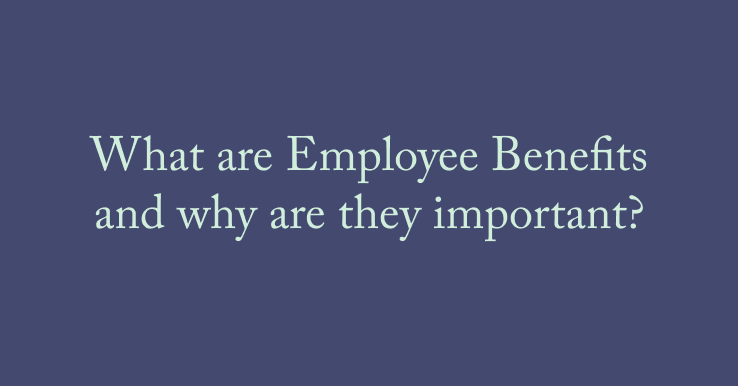What are Employee Corporate Health Benefits?
No matter the industry or profession, today’s fast-paced business environment comes with more challenges and stresses than ever before. Many people spend most of their time at work, leaving less time for personal or family engagements. While this seems like a grim reality, organizations can do more to nurture their personnel, so they feel fulfilled and inspired.
One of the best ways to do this is with employee benefit programs. Giving employees the benefits they value leads to a more satisfied workforce. From increased productivity and creativity to fewer missed workdays and commitment to company goals, the merits have been well documented.
However, no two companies are encouraged by the same actions and offers. Depending on the type of organization and the job, employee benefits may need to be quite different. But first, what are employee benefits, and how should companies approach them?

What are Employee Benefits
To put it simply, these are the benefits offered to employees in addition to salaries and wages. The most common benefits include overtime, medical insurance, and retirement benefits. However, companies have been known to take it a notch higher and include other benefits. For example, Google is known for its extensive and unconventional packages such as free gourmet meals, in-house massages, and dry cleaning on campus.
Some benefits programs are required by law, although this can vary from state to state. All across the U.S., for instance, companies must give employees time off to vote, serve on a jury, and perform military service. In contrast, companies are not expected to provide health plans except in Hawaii.
Companies need to do more than just offer state-mandated benefits if they want to stay competitive with their employees. One pertinent example is that job applicants’ top query is “is medical insurance part of the employee health benefits offered in this position?” Fail to provide it, and top candidates will pass on the job.
Why Do Employee Benefits Matter?
As mentioned, attracting and recruiting the best employees is one of the most significant advantages of employee benefits. People searching for new roles consider more factors than just the number on the check at the end of the day. Job description, company culture, and location are some of them. However, employee benefits are some of the key differences that influence decisions for top talent. This is because employee benefits cover the indirect pay of your workforce. In one study, respondents said they would heavily consider choosing a lower-paying job with more perks—especially health insurance and flexible hours—over one with a higher salary. Though more money at the end of the month would be good, in the long run, the lower-paying job is considered a better financial proposition than the other.
Once employees join your workforce, benefits also help retain them. An employee who feels valued and taken care of is less likely to jump ship, even if lured with a competitor’s higher salary.
All this goes to prove the importance of employee benefits in keeping your employees happy. Ensuring your employees are healthy and well keeps them motivated and loyal. It helps them focus more on their work, improves performance, and increases their overall quality of life. In the wake of unprecedented times, such as the COVID-19 pandemic, society is more aware than ever of the impact of mental health on happiness, quality of life, and productivity. Creating a consistently supportive environment with virtual employee benefits such as access to physical and mental health care can help build morale and engagement, thus ensuring productivity.
While going without benefits may boost your business’s bottom line in the short run, the positives of employee satisfaction far outweigh the investment.

Examples of Employee Benefits
Some employee benefits are country-specific and, in places like the U.S., state-specific. For example, basic benefits every company must offer in the U.S. include providing employees time off to vote, serve on a jury, and perform military service, as well as complying with all workers’ compensation requirements. However, there are many different types of benefits that can be categorized into four major groups, as follows:
1. Health Benefits
Wellness and healthcare are one of the most important benefits to employees. 88% of respondents in one Employee Benefits Study said that health, dental, and vision insurance are the most valued medical employee benefits.
Health and wellness programs are also highly valued. Simple solutions like gym or club membership go a long way toward improving an employee’s health and wellness. Today, many companies offer full-suite employee wellness programs from providers like Eden Health. These programs allow them to create programs that adapt to their employees’ needs, such as physiotherapy and psychological support.
2. Workplace Benefits
Companies don’t need Google-sized budgets to create a healthy and positive environment for their employees at work. Some highly appreciated activities and offers include:
Flexible Working Hours and Leave Time
This allows employees to decide when and where they want to work. Flexibility is one of the other benefits employees value most.
Skills Development
One of the most stated reasons for employees changing employers is that they felt the new job offered more growth opportunities. Skills development also ensures you and your employees remain competitive by keeping up with developments in your field.
Food and Beverage
Free food at the workplace is one of the most appreciated perks because it saves employees time and money. Companies can also help their employees stay healthy by providing wholesome meals.
Employee Activities
Game nights, running groups, and work anniversary gifts are all examples of things employers can do to boost workplace morale.
3. Financial Benefits
Many corporate benefits fall under this category, but many forget that the purpose of employee benefits is to provide a more quality experience for their staff, covering all facets of their life. Some financial benefits include:
Pension Plans
A 401 (K) plan is one of the most popular pension plans offered by employers. The amount is deducted from the employee’s taxable income, and employers can also contribute to employee’s accounts.
Insurance
Aside from health insurance, other plans such as disability insurance, injury, and parental leave benefits go a long way.
Personal Finance
Access to financial advisors, loans at preferential rates, and savings plans help employees reach their life goals, such as becoming homeowners and entrepreneurs.
Bonuses, Commissions, and Buy-In Possibilities
Employees are more motivated when they feel like the company’s success also positively affects their paycheck. Also, giving employees opportunities to buy shares of their company gives them a sense of ownership.
4. Lifestyle Benefits
Ensuring an excellent work-life balance with benefits such as childcare and vacation days are some of the most important lifestyle benefits a company can offer. Other popular lifestyle benefits include:
- Company-sponsored transport services such as scheduled pickups and drops to and from work or late-cabs.
- Vacation reimbursement.
The Best Types of Employee Benefits
People consider a lot of factors when looking for a new role. While offering perks is a good way to get them to consider a position, experts advise that companies should focus more on long-term improvement of morale and workplace culture than simple, commonplace gestures like a dinner voucher or impromptu day off.
We should note that such benefits will not necessarily be harmful or unappreciated. A timely offering, such as an extended weekend when a challenging project is completed, shows your employees that you care while rewarding good work. This can be great for positive reinforcement. The difference in the latter situations is that the benefits are initiated with the employee in mind and thus are more effective.
Health benefits such as insurance, mental, and physical wellness programs are some of the most expensive benefits companies offer. However, employees appreciate these the most. Paying for health insurance out of pocket is expensive, not to mention the high cost of doctor’s bills. These factors are strong enough to influence people’s career decisions.
Costs aside, an employee who has access to healthcare is more relaxed and happier, thus being more creative and productive at work. Paying doctors’ bills without insurance is worse, so it makes sense for applicants to make career decisions regarding insurance benefits.
Give Your Team a Transformative Health Experience
As companies adjust and recover from disruptions like the COVID-19 pandemic, the importance of offering employees health benefits is not lost on those in charge of hiring and managing staff. Eden Health provides one platform to meet your employees’ medical needs, giving them access to a care team of medical providers, behavioral health specialists, and insurance experts anytime they need it.
We help customers reduce their healthcare costs, gain visibility on their spending, and drive a high ROI (return on investment) on employee health. Call us today to learn more about our employee health benefits and how we help companies save money on medical spending. You can also request a demo online.





